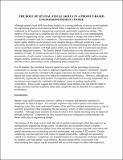The Role of Spatial-Visual Skills in a Project-Based Engineering Design Course
Author(s)
Tseng, Tiffany; Yang, Maria
DownloadYang_The Role.pdf (2.987Mb)
OPEN_ACCESS_POLICY
Open Access Policy
Creative Commons Attribution-Noncommercial-Share Alike
Terms of use
Metadata
Show full item recordAbstract
Although spatial-visual skills have been found to be a strong predictor of success in and aptitude
for engineering practice and related technical fields, comparatively little research has been
conducted on its function in engineering coursework, particularly engineering design. The
purpose of this study was to examine the role of spatial-visual skills in a core undergraduate
mechanical engineering design course requiring each student to design and build a robot to
accomplish a complex task in a competition. The researchers hypothesized that students with
higher spatial abilities would produce more complex designs (although complexity is not
necessarily desirable); as spatial abilities are associated with understanding how physical objects
can be assembled, students with high spatial ability may be better able to understand and design
intricate integrated systems. The Purdue Spatial Visualization test was administered to 137
students (79 male, 58 female) at the start of the course, and these results were analyzed with self- assessments of each student’s experience in tasks associated with spatial skills (such as creating
origami models, sketching, and creating CAD models), the complexity of their produced robot,
and their robots’ performance in the culminating class competition.
Date issued
2011-06Department
Massachusetts Institute of Technology. Department of Mechanical EngineeringJournal
Proceedings of the 118th ASEE Annual Conference & Exposition, Session Title: Design Communications & Cognition I, June 26-29, 2011.
Publisher
American Society for Engineering Education
Citation
Tseng, Tiffany and Maria Yang. "The Role of Spatial-Visual Skills in a Project-Based Engineering Design Course." in Proceedings of the 118th ASEE Annual Conference & Exposition, June 26-29, 2011, Vancouver, BC, Canada.
Version: Author's final manuscript
Other identifiers
AC2011-1967